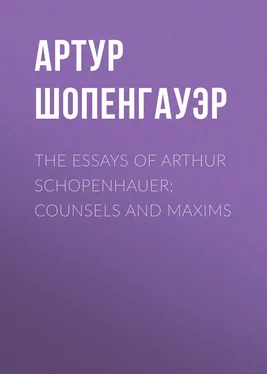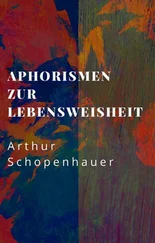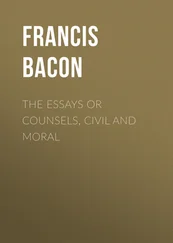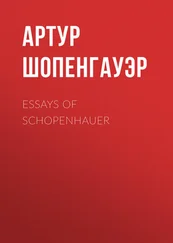Артур Шопенгауэр - The Essays of Arthur Schopenhauer; Counsels and Maxims
Здесь есть возможность читать онлайн «Артур Шопенгауэр - The Essays of Arthur Schopenhauer; Counsels and Maxims» — ознакомительный отрывок электронной книги совершенно бесплатно, а после прочтения отрывка купить полную версию. В некоторых случаях можно слушать аудио, скачать через торрент в формате fb2 и присутствует краткое содержание. Жанр: Философия, literature_19, foreign_antique, foreign_prose, на английском языке. Описание произведения, (предисловие) а так же отзывы посетителей доступны на портале библиотеки ЛибКат.
- Название:The Essays of Arthur Schopenhauer; Counsels and Maxims
- Автор:
- Жанр:
- Год:неизвестен
- ISBN:нет данных
- Рейтинг книги:3 / 5. Голосов: 1
-
Избранное:Добавить в избранное
- Отзывы:
-
Ваша оценка:
- 60
- 1
- 2
- 3
- 4
- 5
The Essays of Arthur Schopenhauer; Counsels and Maxims: краткое содержание, описание и аннотация
Предлагаем к чтению аннотацию, описание, краткое содержание или предисловие (зависит от того, что написал сам автор книги «The Essays of Arthur Schopenhauer; Counsels and Maxims»). Если вы не нашли необходимую информацию о книге — напишите в комментариях, мы постараемся отыскать её.
The Essays of Arthur Schopenhauer; Counsels and Maxims — читать онлайн ознакомительный отрывок
Ниже представлен текст книги, разбитый по страницам. Система сохранения места последней прочитанной страницы, позволяет с удобством читать онлайн бесплатно книгу «The Essays of Arthur Schopenhauer; Counsels and Maxims», без необходимости каждый раз заново искать на чём Вы остановились. Поставьте закладку, и сможете в любой момент перейти на страницу, на которой закончили чтение.
Интервал:
Закладка:
SECTION 6. Limitations always make for happiness . We are happy in proportion as our range of vision, our sphere of work, our points of contact with the world, are restricted and circumscribed. We are more likely to feel worried and anxious if these limits are wide; for it means that our cares, desires and terrors are increased and intensified. That is why the blind are not so unhappy as we might be inclined to suppose; otherwise there would not be that gentle and almost serene expression of peace in their faces.
Another reason why limitation makes for happiness is that the second half of life proves even more dreary that the first. As the years wear on, the horizon of our aims and our points of contact with the world become more extended. In childhood our horizon is limited to the narrowest sphere about us; in youth there is already a very considerable widening of our view; in manhood it comprises the whole range of our activity, often stretching out over a very distant sphere, – the care, for instance, of a State or a nation; in old age it embraces posterity.
But even in the affairs of the intellect, limitation is necessary if we are to be happy. For the less the will is excited, the less we suffer. We have seen that suffering is something positive, and that happiness is only a negative condition. To limit the sphere of outward activity is to relieve the will of external stimulus: to limit the sphere of our intellectual efforts is to relieve the will of internal sources of excitement. This latter kind of limitation is attended by the disadvantage that it opens the door to boredom, which is a direct source of countless sufferings; for to banish boredom, a man will have recourse to any means that may be handy – dissipation, society, extravagance, gaming, and drinking, and the like, which in their turn bring mischief, ruin and misery in their train. Difficiles in otio quies – it is difficult to keep quiet if you have nothing to do. That limitation in the sphere of outward activity is conducive, nay, even necessary to human happiness, such as it is, may be seen in the fact that the only kind of poetry which depicts men in a happy state of life – Idyllic poetry, I mean, – always aims, as an intrinsic part of its treatment, at representing them in very simple and restricted circumstances. It is this feeling, too, which is at the bottom of the pleasure we take in what are called genre pictures.
Simplicity , therefore, as far as it can be attained, and even monotony , in our manner of life, if it does not mean that we are bored, will contribute to happiness; just because, under such circumstances, life, and consequently the burden which is the essential concomitant of life, will be least felt. Our existence will glide on peacefully like a stream which no waves or whirlpools disturb.
SECTION 7. Whether we are in a pleasant or a painful state depends, ultimately, upon the kind of matter that pervades and engrosses our consciousness. In this respect, purely intellectual occupation, for the mind that is capable of it, will, as a rule, do much more in the way of happiness than any form of practical life, with its constant alternations of success and failure, and all the shocks and torments it produces. But it must be confessed that for such occupation a pre-eminent amount of intellectual capacity is necessary. And in this connection it may be noted that, just as a life devoted to outward activity will distract and divert a man from study, and also deprive him of that quiet concentration of mind which is necessary for such work; so, on the other hand, a long course of thought will make him more or less unfit for the noisy pursuits of real life. It is advisable, therefore, to suspend mental work for a while, if circumstances happen which demand any degree of energy in affairs of a practical nature.
SECTION 8. To live a life that shall be entirely prudent and discreet, and to draw from experience all the instruction it contains, it is requisite to be constantly thinking back, – to make a kind of recapitulation of what we have done, of our impressions and sensations, to compare our former with our present judgments – what we set before us and struggle to achieve, with the actual result and satisfaction we have obtained. To do this is to get a repetition of the private lessons of experience, – lessons which are given to every one.
Experience of the world may be looked upon as a kind of text, to which reflection and knowledge form the commentary. Where there is great deal of reflection and intellectual knowledge, and very little experience, the result is like those books which have on each page two lines of text to forty lines of commentary. A great deal of experience with little reflection and scant knowledge, gives us books like those of the editio Bipontina 13 13 Translator's Note . A series of Greek, Latin and French classics published at Zweibräcken in the Palatinate, from and after the year 1779. Cf. Butter, Ueber die Bipontiner und die editiones Bipontinae .
where there are no notes and much that is unintelligible.
The advice here given is on a par with a rule recommended by Pythagoras, – to review, every night before going to sleep, what we have done during the day. To live at random, in the hurly-burly of business or pleasure, without ever reflecting upon the past, – to go on, as it were, pulling cotton off the reel of life, – is to have no clear idea of what we are about; and a man who lives in this state will have chaos in his emotions and certain confusion in his thoughts; as is soon manifest by the abrupt and fragmentary character of his conversation, which becomes a kind of mincemeat. A man will be all the more exposed to this fate in proportion as he lives a restless life in the world, amid a crowd of various impressions and with a correspondingly small amount of activity on the part of his own mind.
And in this connection it will be in place to observe that, when events and circumstances which have influenced us pass away in the course of time, we are unable to bring back and renew the particular mood or state of feeling which they aroused in us: but we can remember what we were led to say and do in regard to them; and thus form, as it were, the result, expression and measure of those events. We should, therefore, be careful to preserve the memory of our thoughts at important points in our life; and herein lies the great advantage of keeping a journal.
SECTION 9. To be self-sufficient, to be all in all to oneself, to want for nothing, to be able to say omnia mea mecum porto – that is assuredly the chief qualification for happiness. Hence Aristotle's remark, [Greek: hae eudaimonia ton autarchon esti] 14 14 Eudem. Eth . VII. ii. 37.
– to be happy means to be self-sufficient – cannot be too often repeated. It is, at bottom, the same thought as is present in the very well-turned sentence from Chamfort:
Le bonheur n'est pas chose aisée: il est très difficile de le trouver en nous, et impossible de le trouver ailleurs .
For while a man cannot reckon with certainty upon anyone but himself, the burdens and disadvantages, the dangers and annoyances, which arise from having to do with others, are not only countless but unavoidable.
There is no more mistaken path to happiness than worldliness, revelry, high life : for the whole object of it is to transform our miserable existence into a succession of joys, delights and pleasures, – a process which cannot fail to result in disappointment and delusion; on a par, in this respect, with its obligato accompaniment, the interchange of lies. 15 15 As our body is concealed by the clothes we wear, so our mind is veiled in lies. The veil is always there, and it is only through it that we can sometimes guess at what a man really thinks; just as from his clothes we arrive at the general shape of his body.
Интервал:
Закладка:
Похожие книги на «The Essays of Arthur Schopenhauer; Counsels and Maxims»
Представляем Вашему вниманию похожие книги на «The Essays of Arthur Schopenhauer; Counsels and Maxims» списком для выбора. Мы отобрали схожую по названию и смыслу литературу в надежде предоставить читателям больше вариантов отыскать новые, интересные, ещё непрочитанные произведения.
Обсуждение, отзывы о книге «The Essays of Arthur Schopenhauer; Counsels and Maxims» и просто собственные мнения читателей. Оставьте ваши комментарии, напишите, что Вы думаете о произведении, его смысле или главных героях. Укажите что конкретно понравилось, а что нет, и почему Вы так считаете.












